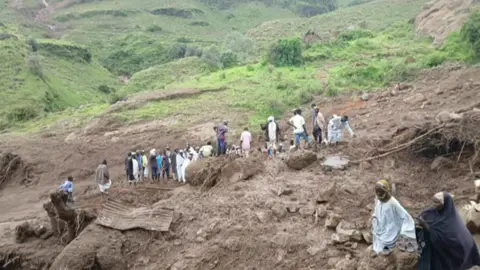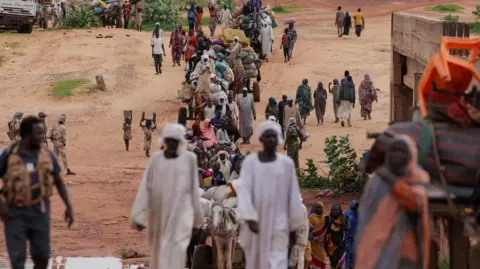Reem al-Kari and her cousin Lama are searching through dozens of photos of children spread out on a desk. Lama thinks she spots one with a likeness to Karim, Reem's missing son.
Karim was two-and-a-half when he and his father disappeared, in 2013 during Syria's civil war, as they ran an errand. He is one of more than 3,700 children still missing since the fall of the Assad dictatorship. He would now be 15.
Are his eyes green? asks the man behind the desk, the new manager of Lahan Al Hayat, a Syrian-run children's shelter which former first lady Asma al-Assad helped establish in 2013. He is looking at one of the photos the women have picked out, comparing it to a photo of Karim aged two.
Yes, comes the reply.
The hairline… the man muses. There is a similarity but… His voice trails off. The task is enormous.
Lahan Al Hayat is one of several Syrian childcare facilities which were used to hold the children of detained parents during the 2011-2024 civil war. Instead of re-homing the children with their relatives, the youngsters were held in orphanages and used as political pawns. In some cases, the children were falsely recorded as orphans, or their identities changed, making tracing them - then and now - all the more difficult.
When Assad's dictatorship suddenly collapsed in December, journalists, activists, and families had access to sources, locations, and documents previously unimaginable under his decades-long rule. The BBC World Service has worked with investigative media organization Lighthouse Reports and five other outlets to build a database of 323 children hidden by the Syrian regime from their relatives in a network of orphanages. We did this by reviewing and authenticating thousands of leaked and gathered documents.
Analysis of these records shows the organization running orphanages which took more children than any other was an Austria-headquartered charity, SOS Children's Villages International. SOS operates in more than 130 countries and raises about €1.6bn ($1.9bn) a year, including from the UN, European governments, and personal donations.
We spoke to more than 50 SOS whistleblowers. Several said most of the senior positions at SOS in Syria had been appointed directly by the Assad palace, and that Asma al-Assad - who, along with her husband Bashar, was sanctioned by the EU and the UK for human rights abuses - had an influential role in the organization.
We were also told that the charity began bringing in any child regardless of their circumstances to obtain more funding.
SOS responded: We do not offer financial rewards for increasing the number of orphans, and denied any formal link between the charity and the Assad family.
SOS has already admitted, following an internal review, that 140 children without proper documentation were taken in by SOS Syria between 2013 and 2018. It has said 104 of these were subsequently taken back by the Syrian intelligence services or the Social Affairs Ministry, and about whose whereabouts SOS now has no knowledge. The charity has also said it had stopped receiving children of political detainees in 2018.
However, paperwork indicates their continued transfer to SOS up until 2022.
Many parents still have no idea what happened to their children. The quagmire of falsified and lost records for Syria's missing children means surviving mothers and fathers are left to hunt from one institution to the next for information. This includes Reem, who is still searching for Karim. "text_continuation": "Before she drew a blank at Lahan Al Hayat, she had visited Syria's Social Affairs Ministry. There she was told the minister was abroad, the manager in charge of the missing persons file was on holiday, and then finally that work on missing children had been transferred to a security agency on the ministry's fifth floor. Reem went upstairs, accompanied by a BBC film crew. We were promptly told to stop filming despite having permission to do so, and the ministry refused to provide Reem with any further assistance.
A new investigation into the fate of the children under the previous regime was announced by the ministry in May. But it has limited staff and resources, with just a few volunteers tasked with reviewing thousands of documents, and has yet to release any findings.
Reem's search for Karim, along with the growing evidence implicating SOS Children's Villages in the systematic disappearance of children under Assad's regime, highlights a tragic chapter in Syria's civil war that the international community must continue to confront."
Karim was two-and-a-half when he and his father disappeared, in 2013 during Syria's civil war, as they ran an errand. He is one of more than 3,700 children still missing since the fall of the Assad dictatorship. He would now be 15.
Are his eyes green? asks the man behind the desk, the new manager of Lahan Al Hayat, a Syrian-run children's shelter which former first lady Asma al-Assad helped establish in 2013. He is looking at one of the photos the women have picked out, comparing it to a photo of Karim aged two.
Yes, comes the reply.
The hairline… the man muses. There is a similarity but… His voice trails off. The task is enormous.
Lahan Al Hayat is one of several Syrian childcare facilities which were used to hold the children of detained parents during the 2011-2024 civil war. Instead of re-homing the children with their relatives, the youngsters were held in orphanages and used as political pawns. In some cases, the children were falsely recorded as orphans, or their identities changed, making tracing them - then and now - all the more difficult.
When Assad's dictatorship suddenly collapsed in December, journalists, activists, and families had access to sources, locations, and documents previously unimaginable under his decades-long rule. The BBC World Service has worked with investigative media organization Lighthouse Reports and five other outlets to build a database of 323 children hidden by the Syrian regime from their relatives in a network of orphanages. We did this by reviewing and authenticating thousands of leaked and gathered documents.
Analysis of these records shows the organization running orphanages which took more children than any other was an Austria-headquartered charity, SOS Children's Villages International. SOS operates in more than 130 countries and raises about €1.6bn ($1.9bn) a year, including from the UN, European governments, and personal donations.
We spoke to more than 50 SOS whistleblowers. Several said most of the senior positions at SOS in Syria had been appointed directly by the Assad palace, and that Asma al-Assad - who, along with her husband Bashar, was sanctioned by the EU and the UK for human rights abuses - had an influential role in the organization.
We were also told that the charity began bringing in any child regardless of their circumstances to obtain more funding.
SOS responded: We do not offer financial rewards for increasing the number of orphans, and denied any formal link between the charity and the Assad family.
SOS has already admitted, following an internal review, that 140 children without proper documentation were taken in by SOS Syria between 2013 and 2018. It has said 104 of these were subsequently taken back by the Syrian intelligence services or the Social Affairs Ministry, and about whose whereabouts SOS now has no knowledge. The charity has also said it had stopped receiving children of political detainees in 2018.
However, paperwork indicates their continued transfer to SOS up until 2022.
Many parents still have no idea what happened to their children. The quagmire of falsified and lost records for Syria's missing children means surviving mothers and fathers are left to hunt from one institution to the next for information. This includes Reem, who is still searching for Karim. "text_continuation": "Before she drew a blank at Lahan Al Hayat, she had visited Syria's Social Affairs Ministry. There she was told the minister was abroad, the manager in charge of the missing persons file was on holiday, and then finally that work on missing children had been transferred to a security agency on the ministry's fifth floor. Reem went upstairs, accompanied by a BBC film crew. We were promptly told to stop filming despite having permission to do so, and the ministry refused to provide Reem with any further assistance.
A new investigation into the fate of the children under the previous regime was announced by the ministry in May. But it has limited staff and resources, with just a few volunteers tasked with reviewing thousands of documents, and has yet to release any findings.
Reem's search for Karim, along with the growing evidence implicating SOS Children's Villages in the systematic disappearance of children under Assad's regime, highlights a tragic chapter in Syria's civil war that the international community must continue to confront."

















